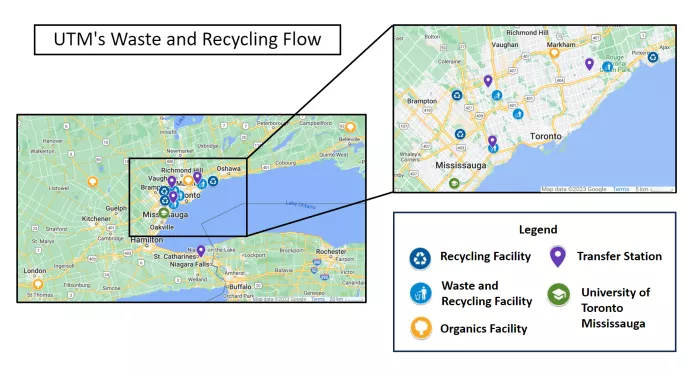Common Items Recycling
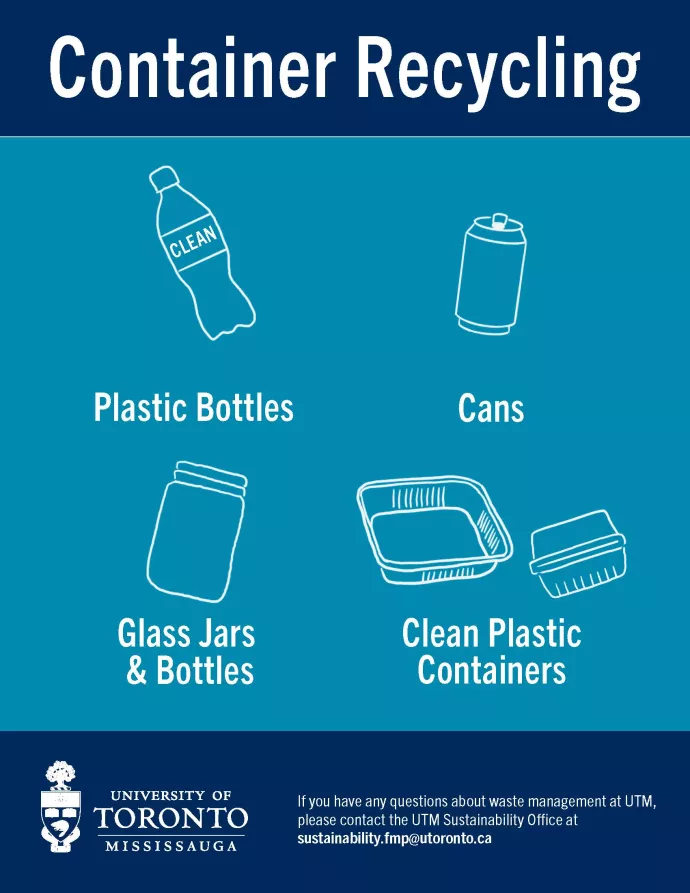
| Accepted Items |
| Clean* plastic containers, jars, and bottles (leave lid on) |
| Clean* disposable plastic plates, cups, and cutlery |
| Glass jars & bottles (leave lid on) |
| Cans (e.g. Coca Cola)** |
| Beverage containers (e.g. milk cartons and juice boxes)** |
*Clean can be defined as unused or non soiled/greasy items
**Beverage containers should not contain liquids; if you cannot finish the drink, dump the remaining liquid into a nearby sink (e.g. bathroom) or flush it down the toilet, and throw the cup/bottle into a container recycling bin.
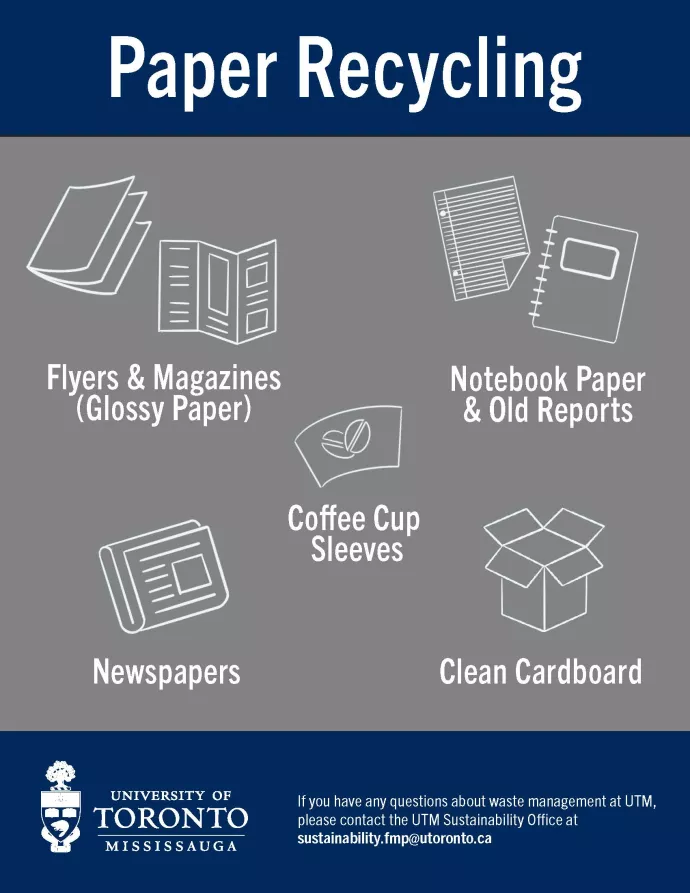
| Accepted Items |
| Office papers |
| *Cardboard (e.g. Amazon boxes, clean** pizza box) |
| Notebooks and old reports/assignments |
| Newspapers, flyers, and magazines |
| Coffee cup sleeves |
*Make sure to flatten cardboard boxes before placing them into the stream
**Clean can be defined as unused or non soiled/greasy items
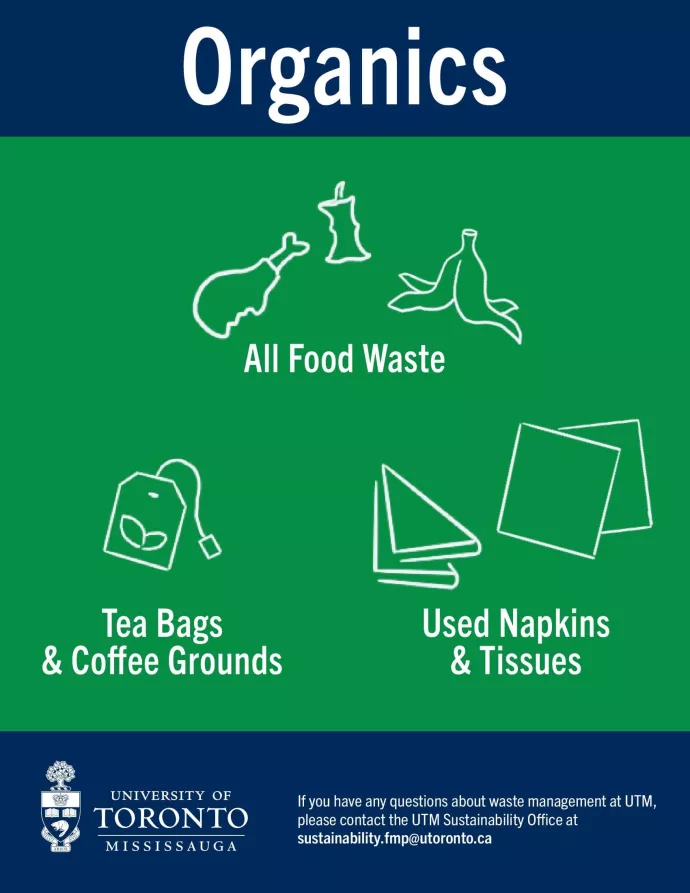
| Accepted Items |
| Food waste (e.g. fruit, meat, pasta) |
| Tea bags and coffee grounds |
| Greasy pizza box |
| Used paper towels, napkins, and tissues |
| Non-waxed and paper-based fast food packaging |
| Compostable or paper* plates, containers, and cups |
*Compostable or paper items made out of or lined/waxed with plastic are not compostable and must be placed in the landfill bin.
PLEASE NOTE: If you have leftover or unfinished food in a food container, please dump the food into organics first before disposing the food container in the correct stream (see below).
- Clear plastic container: Container Recycling
- Compostable (labeled as "compostable") or paper container: Organics
- Takeout (lined or waxed with plastic, has no recycling symbol) or black plastic container: Landfill
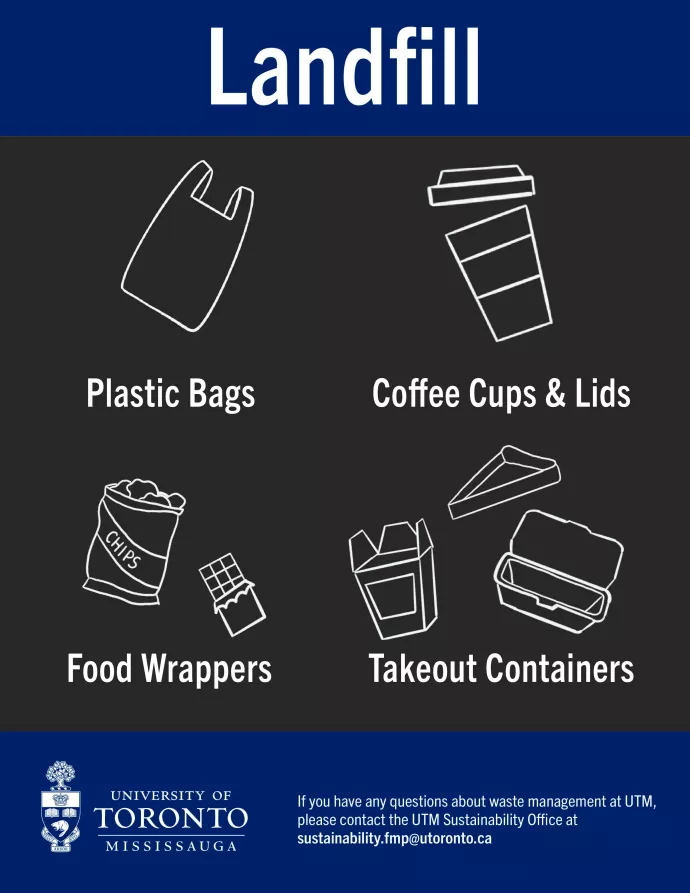
| Accepted Items |
| Coffee cups & lids (e.g. Tim Hortons, Starbucks) |
| Food wrappers (e.g. chips bags, granola bar wrapper) |
| Soiled/greasy plastic and Styrofoam takeout containers and cutlery |
| Black plastic food containers (e.g. Bento sushi) |
| Aluminum foil |
| Straws (with wax/plastic lining) |
| Plastic bags |
Special Items Recycling
Batteries, E-Waste, and Printer Cartridges
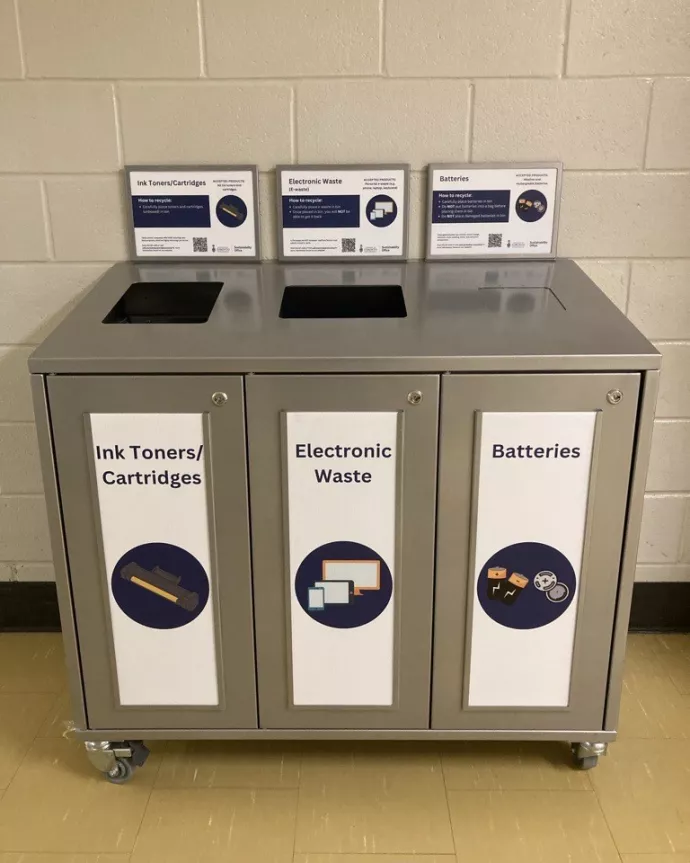
The Sustainability Office has introduced four specialty recycling stations on campus. The UTM community can drop off batteries, personal e-waste (non-UofT purchased), and printer cartridges at the stations.
For UofT purchased e-waste, please submit a ticket to ensure proper scrubbing of all confidential material before disposal. Submit a ticket
The goal of the stations is to increase awareness of the importance of special item recycling and encourage the UTM community to easily drop off and recycle their special items in central locations on campus.
Drop-off Locations
Building | Location |
William G. Davis Building | First floor (across from bookstore) |
Instructional Centre | First floor (across from food court) |
Deerfield Hall | First floor (beside AED station) |
CCIT | Near IT Help Desk |
To learn more about recycling these specialty items on campus, please view the drop downs below.
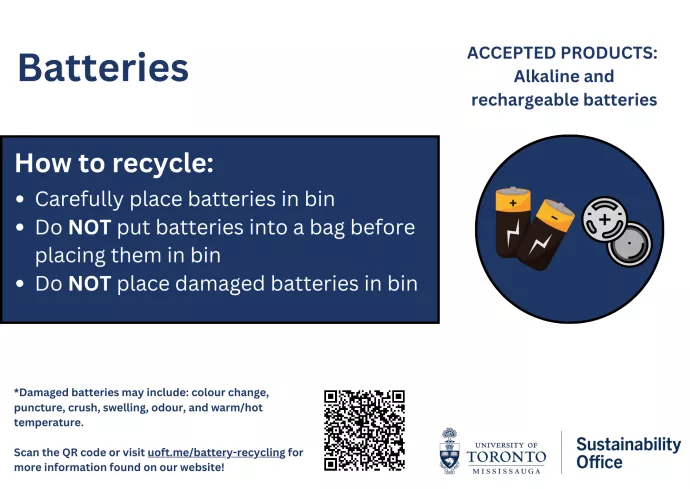
Batteries are accepted at any of the four specialty recycling centres across campus. To dispose of large or hazardous batteries, please contact UTM Shipping & Receiving.
What if my battery is damaged?
Damaged batteries may include: colour change, puncture, crush, swelling, odour, and warm/hot temperature.
If your battery is showing any of the above characteristics, DO NOT place it in the battery bin.
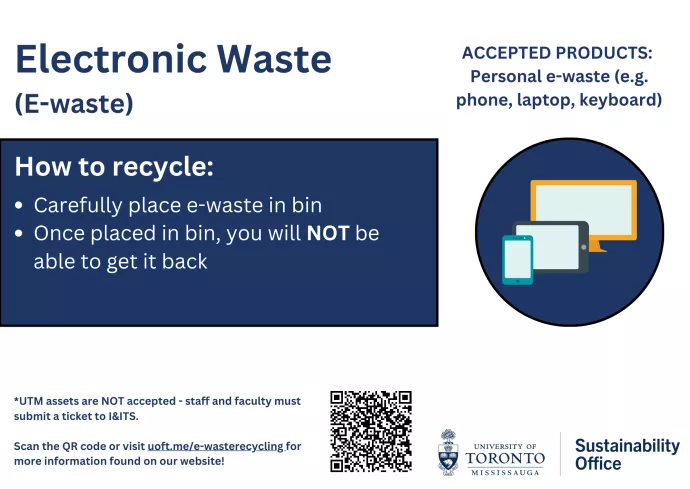
E-waste (personal use ONLY) is accepted at any of the four specialty recycling centres across campus.
For staff and faculty use, upon request I&ITS staff will pick up and dispose of IT assets purchased with university funds. Assets including smartphones, desktop and laptop hard drives are securely wiped before disposal. Please submit a ticket: https://uoft.me/E-Waste
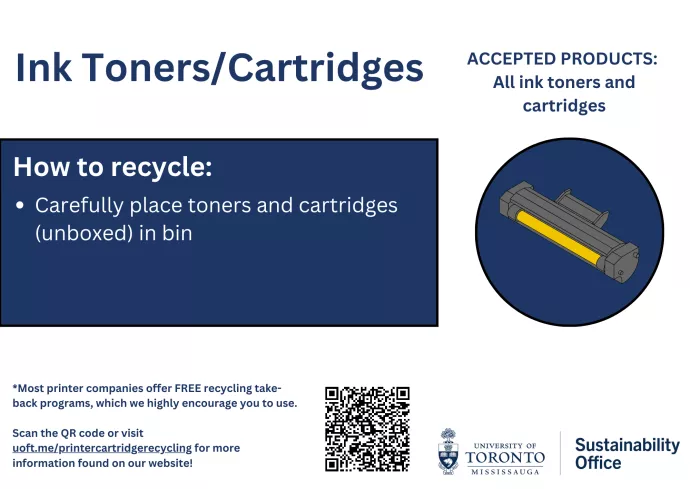
Ink cartridges/toners are accepted at any of the four specialty recycling centres across campus.
Please note: Majority of printer companies offer recycling take-back programs, which we highly encourage you to use. Use the mailing label and send your empty cartridges back to your printer company.
If you have questions about whether a particular object can be recycled or how to dispose of it properly, email sustainability.fmp@utoronto.ca.
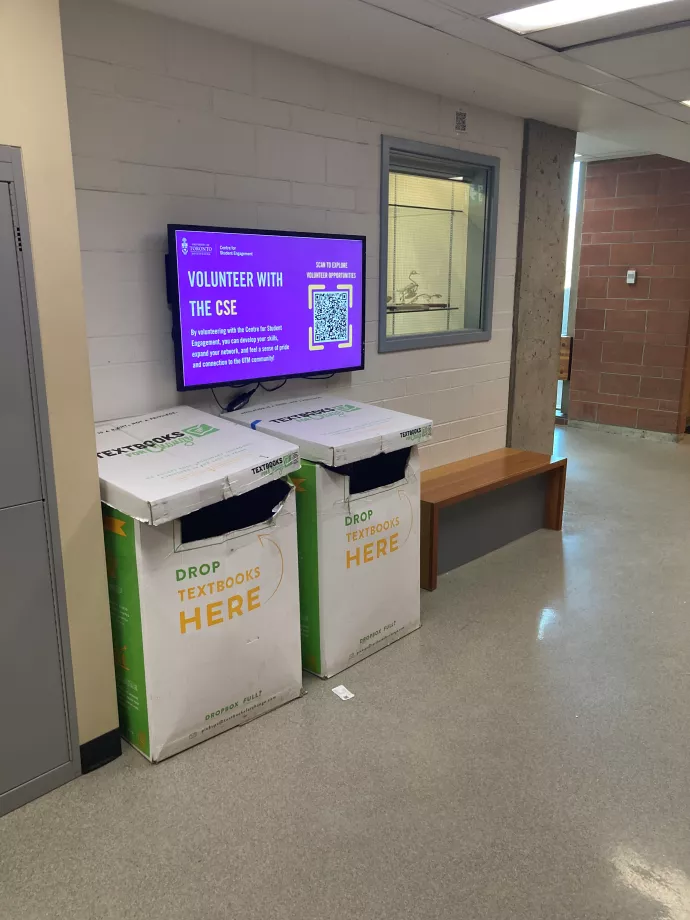
Textbooks For Change is a social enterprise that donates textbooks from post-secondary schools to countries in Africa, resells them at affordable prices in Canada, and recycles out-of-date and damaged books.
Students can drop off old/used textbooks in the Textbooks For Change drop box located on the second floor of the Davis Building. A Textbooks For Change representative picks up the textbooks every five weeks.
Individual departments are responsible for managing and coordinating their confidential shredding services through a third party (e.g. Iron Mountain, Blue Pencil) or on-campus services (e.g. UTM Print Shop – see below).
The UTM Print Shop offers shredding services. Departments must fill out a waiver form before proceeding any further. For more information, visit The Print Shop – Shredding.
Learn more about UofT’s policies on record destruction.
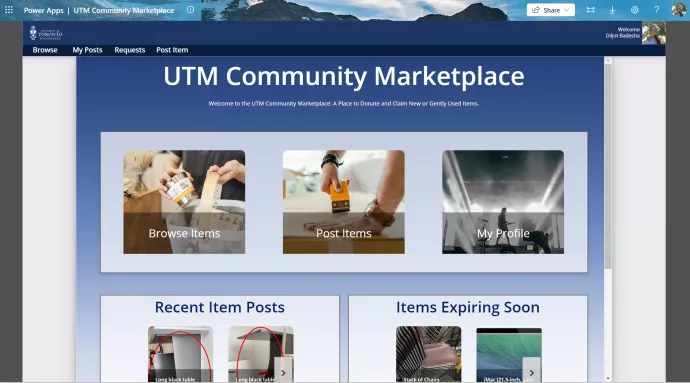
The Community Marketplace App is a platform where you can donate and claim new or gently used items on campus.
The app will play a vital role in avoiding the unnecessary disposal of items, such as furniture, and helping divert these materials from the landfill.
Please note we are in the pilot phase of the Marketplace app and will expand it to more campus departments soon. As of now, only FMP Planners, Project Managers, and office/department managers have access to the app. Make sure to connect with your office/department manager to upload or claim items on the app.
Individuals and labs are responsible for safely transporting their hazardous waste (e.g. chemical waste, sharps) to Shipping & Receiving located in Davis and New Science Building (NSB).
For a detailed overview of managing hazardous waste at UTM, review the Standard Operating Procedure on Chemical Waste Management developed by UTM’s Chemical & Physical Sciences (CPS) department.
Learn more about U of T’s Environmental Health & Safety policies here.
If you have any questions about your hazardous waste and how to handle it, please contact UTM Shipping & Receiving.
UTM’s maintenance staff is responsible for collecting lightbulbs and fluorescent tubes from maintenance and renovation projects across campus.
If staff/faculty have desktop and personal light bulbs, please bring them down to Shipping & Receiving.
The Grounds team is responsible for collecting scrap wood and metal on campus. Our waste hauler, GFL, picks up the wood and metal monthly.
For instance, the Region of Peel follows a single-stream recycling system. It collects all recyclables (i.e. container, paper) in a single recycling bin.
UTM, on the other hand, follows a dual-stream recycling system. The campus encourages students, staff, and faculty to separate containers from paper as evident with the 4-in-1 bins and signage across campus.
Why is that the case?
Waste Reduction Group, the private waste hauler that collects UTM’s recycling, transports it to container recycling facilities and paper recycling facilities scattered across the GTA and beyond.
While the Region has several recycling facilities where only paper or containers are collected, there are only a few single-stream facilities, including the Material Recovery Facility (MRF) in Brampton. Single-stream facilities currently face limited capacity issues as increasing amounts of residential waste are sent to their locations.
Now with the option to send recycling to separate facilities, the campus can process recyclables more effectively and efficiently.
A transfer station is where waste and recyclable items are temporarily held and sorted before they are transferred to another location for further sorting or end-of-life disposal.
Organic waste, such as food scraps, yard and leaf waste, is broken down into compost through aerobic and anaerobic processes. The compost is then sold to off-site markets (e.g. stores, farms).
A: After you have done your due diligence (e.g. skimmed the Sustainability Office website, searched on Google) and are still in doubt, you can THEN proceed to throw your item in the landfill/garbage bin!
This is to avoid contamination in our recycling bins and ensure items are properly recycled.
Once the majority of a recycling or organics bag is contaminated with items that do not belong in it, such as coffee cups, the bag will most likely not be recycled and unfortunately go to landfill.
How to Sort Your Waste in Classrooms

In the 2023/2024 academic year, the Sustainability Office made some operational changes to waste sorting in classrooms on the North side of campus (MN, DH, and IB).
Why? We observed classroom bins mostly being used as door stops, instead of for waste disposal.
Additionally, this is a best practice across higher education institutions in an effort to fill hallway bins completely, instead of only filling classroom bins less than half full.
Larger rooms, such as IB110, have a three-stream waste system with the appropriate signage to encourage correct sorting of waste.
Please make sure to read the signage properly before throwing away your waste.
We have removed bins from smaller classrooms, tutorial rooms, and study rooms to encourage students to use the 4-in-1 hallways bins.
Please make sure to pick up all your waste and dispose of it properly before leaving the room to keep UTM clean!
Did you know?
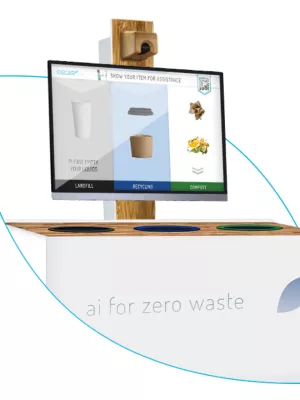
Oscar is an AI robot that helps you sort your waste!
All you have to do is place your item in front of its camera and it will let you know what stream (landfill, paper recycling, container recycling, or organics) your item should go into.
Oscar is currently located in the Davis Food Court and Deerfield Hall.

